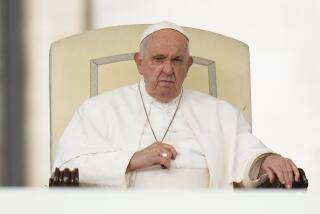Journey May Be Pontiff’s Swan Song to Poland
- Share via
GDANSK, Poland — Pope John Paul II returned to his native land Saturday for a seventh and probably final sojourn to celebrate Eastern Europe’s moral victory over communism a decade ago and pray for those still suffering in despotism’s tenacious grip.
Against the backdrop of continued bloodshed and sorrow in the shattered Balkans, the pontiff praised his fellow Poles for heeding “the cry of conscience” that rang out from shipyard workers of this Baltic Sea port demanding dignity and human rights.
“It was in this city that Solidarity was born 19 years ago,” the frail and emotional pope noted during the first of two dozen Masses and speeches he is scheduled to give during his 13-day visit. “This was an event which signaled a turning point in the history of our nation and in the history of Europe.”
Recalling that he appealed for democracy and spiritual renewal during his last visit to Gdansk, 12 years ago, the nostalgic pontiff observed that he was “also speaking in your name. Today, things are different--thank God.”
The pope’s role in the downfall of communism is seen by many as the crowning achievement of his 20-year papacy, as Solidarity’s rise to power and the rebirth of democracy throughout the region ended nearly half a century of enforced atheism and stifling of the human spirit under communism’s yoke.
While John Paul’s visit is expected to draw as many as one in four adult Poles to his speeches, appearances and Masses, the pope’s longest-ever tour in Europe is marked by what many Poles find a sad atmosphere of closure. His 800-mile hopscotching of his native country has him visiting 19 cities and towns and completing a longtime agenda of meeting the masses in all 40 dioceses of Poland. He also plans to visit the graves of his parents in Krakow, commemorate important events in Polish history, meet with friends from the early days of his priesthood and consecrate several prominent sites of pilgrimage to afford them a legacy into the next millennium.
At 79 and apparently suffering from Parkinson’s disease, the pope is unlikely to again make such a long and exhausting trip home to a Poland that is changing dramatically and to a circle of friends that the march of time makes smaller each year.
“People don’t allow themselves to say it out loud, but this is probably his last visit home,” said Stanislawa Klewikowska, a 47-year-old secretary holding back tears upon the pontiff’s arrival.
Although his movements were slow and his hand trembled as he read both his arrival speech and the homily during a more than two-hour Mass, the pope seemed enlivened by the cheering, flag-waving throngs that flanked his travel routes and by the Mass that drew 700,000 to a converted horse-racing track.
At the huge open-air Mass, the pope engaged in animated banter with young worshipers who chanted, “Stay with us! We love you!”
After his late-morning arrival, the pontiff brushed aside aides who tried to help him down the stairway from his special Alitalia jet to the runway, pointedly negotiating the daunting descent on his own.
The pope’s next planned foreign trip, to Armenia on July 2-4, was postponed as he was soldiering through his ambitious itinerary here. But the schedule change was reported by Russia’s Itar-Tass news agency to be necessary because of the ill health of Catholicos Karekin I, not the pope, who is 12 years the Armenian primate’s senior.
Still, the atmosphere of John Paul’s latest visit home seems one of setting affairs in order and counting the blessings bestowed on Poland during the pontificate of its native son.
Noting that the strikes by shipyard workers in the 1980s sent out a clarion call for humanity and “opened the doors of freedom to countries enslaved by the totalitarian system,” the pope hailed his homeland’s advance on the road to prosperity and its strength, “like a great, historic oak tree with healthy roots.”
But he also alluded to the unfinished work of strengthening democracy across the Continent and combating poverty and injustice at home.
“Man will never be happy at the expense of another man, destroying his freedom, trampling people’s dignity and cultivating selfishness,” the pope said in what sounded like an allusion to the war in the Balkans, which he condemned on the eve of his visit here as “a defeat for humanity.”
John Paul’s last visit came before Solidarity swelled into a nationwide demand for democracy and before the hard-line Communists who had ruled Poland for half a century were moved aside.
Polish President Aleksander Kwasniewski credited the pope with setting in motion the wave of democracy that washed over Eastern Europe.
“Without that, the historic breakthrough of the last decade would not have occurred,” Kwasniewski said in his welcoming speech to the pontiff. “The face of the Earth would not have changed.”
On this visit, the pope saw a city flourishing with private shops and Western conveniences and, if not for the road closures and detours dictated by the need for security surrounding his visit, would have noticed the horn-honking traffic jams that testify to the city’s newfound prosperity.
During this trip, the pope also will canonize a 13th century Polish Hungarian, Princess Kunegude, and beatify 108 victims of the Nazis, during events in Warsaw next weekend.
More to Read
Sign up for Essential California
The most important California stories and recommendations in your inbox every morning.
You may occasionally receive promotional content from the Los Angeles Times.














